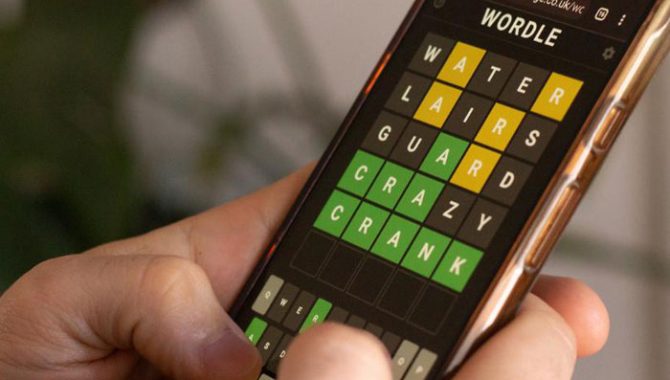—-
To stay in the loop with the latest features, news and interviews from the creative community around licensing, sign up to our weekly newsletter here

With the online word puzzle Wordle soaring in popularity, Start Licensing’s Ian Downes looks at how Wordle could expand into consumer products and live experiences.
Wordle is certainly grabbing people’s attention. I heard a long chat about it on Radio 5 recently centred on the spelling of ‘favor’. This is encouraging from a licensing point of view.
A challenge for Wordle to enter the licensing market will be design assets and brand identity.
Scrabble is a great example of a word-based game that has had some success in licensing. A particular highpoint for the brand was a gifting range developed by Wild & Wolf that made use of the individual letters and tiles. Wild & Wolf used this iconic design to create items like mugs, coasters and keyrings featuring individual letters. They merchandised the range well with the whole alphabet being available making it a very popular gift range.

Wild & Wolf also used Scrabble’s branding and colourways well, picking up on box art to create point of sale materials which tapped into the brand well. Scrabble has also featured on items such as National Lottery scratch cards, gaming machines and in promotions. It’s a good role model for other word-based games.

One area that might work for Wordle is newspaper syndication. Many papers and magazines have puzzle pages. Content-wise, they often buy in branded content from syndication agencies. Scrabble has been used in this way and with careful curation this could be an opportunity for Wordle as could publishing in general.
Given the creativity in the world of toys and games, it would be no surprise to see Wordle working in board games. A challenge will of course be translating the gameplay into new formats and having content that is enduring… That said, I suspect these challenges would be well met by development teams.
A further opportunity for Wordle could be in the world of TV. Games shows like QI, Countdown and Only Connect have shown that word challenges and ‘thinking’ quiz shows have a market. It’s possible that with new technology and a thoughtful approach to the format, Wordle could work in the world of TV. A successful show could potentially be sold internationally and create a platform for further consumer product development.
With advances in technology there could also be opportunities for Wordle to develop partnerships with companies like train and airline companies, with travellers having the opportunity to play on the go and perhaps compete with other travellers.
Given that leisure operators are looking for new ways of engaging with consumers by leveraging brands, it’s not unrealistic to think of Wordle being used for social gaming in the leisure sector. Companies like Electric Gamebox have created social gaming environment and other operators have found ways to develop experiences featuring sports like golf and clay pigeon shooting. Why not word games?

Promotions and advertising could be another outlet for Wordle. Given the nature of the game and the focus on 5 letter words, it could well translate into advertising campaigns for brands with five letter names or potentially create opportunities for ‘collabs’ with characters. One close to home for me springs to me: Morph and Wordle might be well matched!

I asked Jon Morse, Senior Designer at Tomato Source about Wordle’s brand potential – and the reasons behind its popularity. He said: “Allowing users just one game per day positions Wordle in an almost unique position in the mobile gaming market. It doesn’t try to upsell, cross-sell, or, well, sell anything apart from a brief brain exercise. Wordle is addictive simply because it is good – not because it adopts any of the ethically questionable tactics usually adopted in online gaming to keep us all addicted.”
Jon continued: “While brands are coming under ever-increasing scrutiny, Wordle could position itself as the antithesis to unscrupulous money-grabbing gaming brands. It’s rare for such a popular game app to not require anything in return for its use (payment, data…), which is why Wordle ‘the brand’ could have great synergy with altruistic enterprises. A ‘special edition’ Wordle could be created to support the campaign of a charity such as Great Ormond Street Hospital. It could branch out into physical publishing within the brain puzzles space or be expanded into a larger board game format – all with a charitable profit-share licensing model behind it.”
At the moment, Wordle seems to be on the rise and has attracted a lot of attention. Licensing-wise, this is encouraging and I’m sure it has piqued people’s interest. Of course, to succeed in licensing, any brand has to have a degree of longevity and ongoing consumer engagement.
I am sure creative licensing people will rise to challenge of creating relevant licensed products for Wordle. It will be important that the game remains popular, but given its current success, it’s reasonable to think it will have longevity.
Of course, the owners may not want to get involved in licensing. It isn’t for all brands and brand owners, but Wordle seems well placed to give it a go.
Enter your details to receive Brands Untapped updates & news.